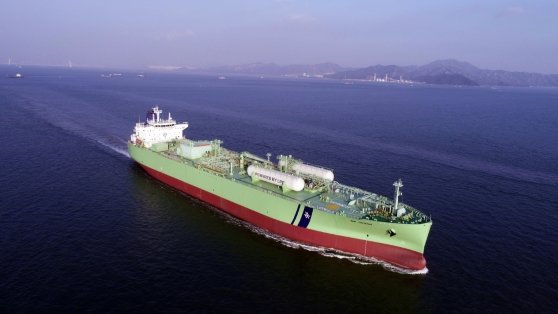
The ‘BW Gemini’, a VLGC from the BW LPG fleet, has had its MAN B&W 6G60ME-C9.2 main engine retrofited to an MAN B&W 6G60ME-C9.5-LGIP dual-fuel type, capable of operating on fuel oil and LPG. The conversion is the first of 15 for a series of LPG carriers owned by BW LPG (picture courtesy BW LPG)
Total of 15 LPG carriers now set for ME-LGIP dual-fuel conversions; number of newbuilding LPG carriers ordered with LPG-burning engines set to take off
Oslo-listed BW LPG – the world's leading owner and operator of LPG vessels – has announced today that it will retrofit a further three MAN B&W 6G60ME-C9.2 type engines to MAN B&W 6G60ME-C9.5-LGIP dual-fuel types, capable of operating on fuel oil and LPG. This is another option of a 4+4+4+3 contract with MAN PrimeServ – MAN Energy Solutions’ after-sales division.
MAN Energy Solutions announced the first four retrofit orders in September 2018 in advance of the official launch of the ME-LGIP engine at its Research Centre Copenhagen, and exchanged the contract publically with BW LPG during the event. Two +4 options were subsequently confirmed with this new +3 option making a total of 15 vessels for ME-LGIP retrofits.
The confirmation of the latest option follows on the heels of the successful ME-LGIP conversion in late-October 2020 of the main engine aboard BW LPG’s LPG carrier, ‘BW Gemini’ making it the world’s first commercial vessel to be propelled by a two-stroke LPG dual-fuel engine.
BW LPG has previously commented on its choice of retrofits over newbuildings where Pontus Berg, Executive Vice President, Technical and Operations, LPG, said: “Retrofitting allows us to minimise our carbon footprint – the process emits up to 97% less carbon dioxide compared to a newbuilding construction. Retrofitting also means that we do not add additional tonnage that the world does not need. In addition, BW LPG’s fleet is already widely recognised amongst charterers for its efficiency, and so retrofitting its vessels to dual-fuel LPG would help to further reinforce the company’s strong reputation in this area.”
Bjarne Foldager, Senior Vice President and Head of Two-Stroke Business at MAN Energy Solutions, said: “We are very happy to confirm this option for a further three retrofits, which in great part is due to the recent successful conversion of the BW Gemini that has since re-entered service. There is no doubt but that we are moving towards a zero-carbon future with a strong global push towards sustainability. These new conversions display BW LPG’s committment to decarbonisation and showcase our dual-fuel engine portfolio that is future-proofed to handle whatever alternative fuels come to prominence in the decades ahead.”
Foldager added: “Apart from the 15 retrofits for BW LPG, three new orders in November bring our current total of newbuilding orders for the ME-LGIP engine up to 51 – a number we expect to significantly increase this month [December 2020].
The vast majority of current orders for LPG carriers over 30,000 cubic metres are with ME-LGIP technology, enabling these vessels to use their own cargo as fuel in the future. In my view, LPG as a low-carbon fuel is well on its way to becoming the new market standard in this segment.”
Business case
With LPG as a marine fuel, the BW Gemini’s output efficiencies rise by around 10% against fuel oil, which will in turn generate notable gains in total voyage fuel-economics. This, along with other advantages, secures LPG’s position as a long-term, sustainable marine fuel.
Cost-wise, LPG is also a better option than compliant fuel oil, with high lifetime-savings prospects. By leveraging LPG as a marine fuel, BW LPG’s vessels benefit from savings due to lower fuel consumption and full dual-fuel flexibility, which guards against price sensitivity to post-2020 fuel price fluctuations. Furthermore, the ability to use LPG cargo as a supplemental fuel source also reduces time and fees for fuel bunkering.
Harnessing LPG propulsion translates into cleaner, more efficient engines that are cheaper to maintain. In addition, the fuel flexibility of dual-fuel engines ensures full redundancy for uninterrupted operations.
Simultaneously, MAN PrimeServ’s research showed that a retrofit would be the most environmentally friendly solution. A retrofitted vessel generates 35 times less CO2-emissions compared to a newbuild vessel and, compared to 2020-compliant fuels, using LPG as a fuel would reduce: SOx by 99%, CO2 by 15%, NOx by 10%, and particulate matter by 90%.
About BW LPG
BW LPG is the world's leading owner and operator of LPG vessels, owning and operating Very Large Gas Carriers (VLGC) with a total carrying capacity of over 3 million CBM. With five decades of operating experience in LPG shipping and experienced seafarers and staff, BW LPG offers a flexible and reliable service to customers. More information about BW LPG can be found at www.bwlpg.com
Source MAN Energy Solutions





.jpg)




